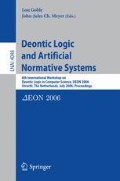Abstract
In this paper we are interested in non-monotonic extensions of Bengt Hansson’s standard dyadic deontic logic 3, known as DSDL3. We study specificity principles for DSDL3 with both controllable and uncontrollable propositions. We introduce an algorithm for minimal specificity which not only covers obligations but also permissions, and we discuss the distinction between weak and strong permissions. Moreover, we introduce ways to combine algorithms for minimal and maximal specificity for DSDL3 with controllable and uncontrollable propositions, based on ‘optimistic’ and ‘pessimistic’ reasoning respectively.
Access this chapter
Tax calculation will be finalised at checkout
Purchases are for personal use only
Preview
Unable to display preview. Download preview PDF.
References
Benferhat, S., Dubois, D., Prade, H.: Possibilistic and standard probabilistic semantics of conditional knowledge bases. Logic and Computation 9(6), 873–895 (1999)
Benferhat, S., Dubois, D., Prade, H.: Towards a possibilistic logic handling of preferences. Applied Intelligence 14(3), 303–317 (2001)
Booth, R., Paris, J.B.: A note on the rational closure of knowledge bases with both positive and negative knowledge. Journal of Logic, Language and Information 7(2) (1998)
Boutilier, C.: Conditional logics of normality: a modal approach. Artificial Intelligence 68, 87–154 (1994)
Boutilier, C.: Toward a logic for qualitative decision theory. In: Proceedings of the 4th International Conference on Principles of Knowledge Representation (KR 1994), pp. 75–86 (1994)
Bulygin, E.: Permissive norms and normative systems. In: Martino, A., Natali, F.S. (eds.) Automated Analysis of Legal Texts, pp. 211–218. Publishing Company, Amsterdam (1986)
Cholvy, L., Garion, C.: Deriving individual obligations from collective obligations. In: Procs. of AAMAS 2003, pp. 962–963 (2003)
Cholvy, L., Garion, C.: Desires, norms and constraints. In: Procs. of AAMAS 2004, pp. 724–731 (2004)
Hansson, B.: An analysis of some deontic logics. Noûs 3, 373–398 (1969); Reprinted in Hilpinen, pp. 121–147 (1971)
Kaci, S., van der Torre, L.W.N.: Algorithms for a nonmonotonic logic of preferences. In: Godo, L. (ed.) ECSQARU 2005. LNCS, vol. 3571, pp. 281–292. Springer, Heidelberg (2005)
Kraus, S., Lehmann, D., Magidor, M.: Nonmonotonic reasoning, preferential models and cumulative logics. Artificial Intelligence 44(1), 167–207 (1990)
Lang, J., Van Der Torre, L., Weydert, E.: Utilitarian desires. Autonomous Agents and Multi-Agent Systems 5, 329–363 (2002)
Lehmann, D., Magidor, M.: What does a conditional knowledge base entail? Artificial Intelligence 55(1), 1–60 (1992)
Lewis, D.: Counterfactuals. Blackwell, Malden (1973)
Pearl, J.: System Z: A natural ordering of defaults with tractable applications to default reasoning. In: Parikh, R. (ed.) Proceedings of the 3rd Conference on Theoretical Aspects of Reasoning about Knowledge (TARK 1990), pp. 121–135. Morgan Kaufmann, San Francisco (1990)
Prakken, H., Sergot, M.J.: Dyadic deontic logic and contrary-to-duty obligations. In: Nute, D. (ed.) Defeasible Deontic Logic. Synthese Library, vol. 263, pp. 223–262. Kluwer, Dordrecht (1997)
Shoham, Y.: Nonmonotonic logics: Meaning and utility. In: Procs. of IJCAI 1987, pp. 388–393 (1987)
Spohn, W.: An analysis of Hansson’s dyadic deontic logic. Journal of Philosophical Logic 4, 237–252 (1975)
van der Hoek, W., Wooldridge, M.: On the logic of cooperation and propositional control. Artif. Intell. 164(1-2), 81–119 (2005)
van der Torre, L., Tan, Y.: Contrary-to-duty reasoning with preference-based dyadic obligations. Annals of Mathematics and Artificial Intelligence 27, 49–78 (1999)
Author information
Authors and Affiliations
Editor information
Editors and Affiliations
Rights and permissions
Copyright information
© 2006 Springer-Verlag Berlin Heidelberg
About this paper
Cite this paper
Kaci, S., van der Torre, L. (2006). Permissions and Uncontrollable Propositions in DSDL3: Non-monotonicity and Algorithms. In: Goble, L., Meyer, JJ.C. (eds) Deontic Logic and Artificial Normative Systems. DEON 2006. Lecture Notes in Computer Science(), vol 4048. Springer, Berlin, Heidelberg. https://doi.org/10.1007/11786849_14
Download citation
DOI: https://doi.org/10.1007/11786849_14
Publisher Name: Springer, Berlin, Heidelberg
Print ISBN: 978-3-540-35842-8
Online ISBN: 978-3-540-35843-5
eBook Packages: Computer ScienceComputer Science (R0)

